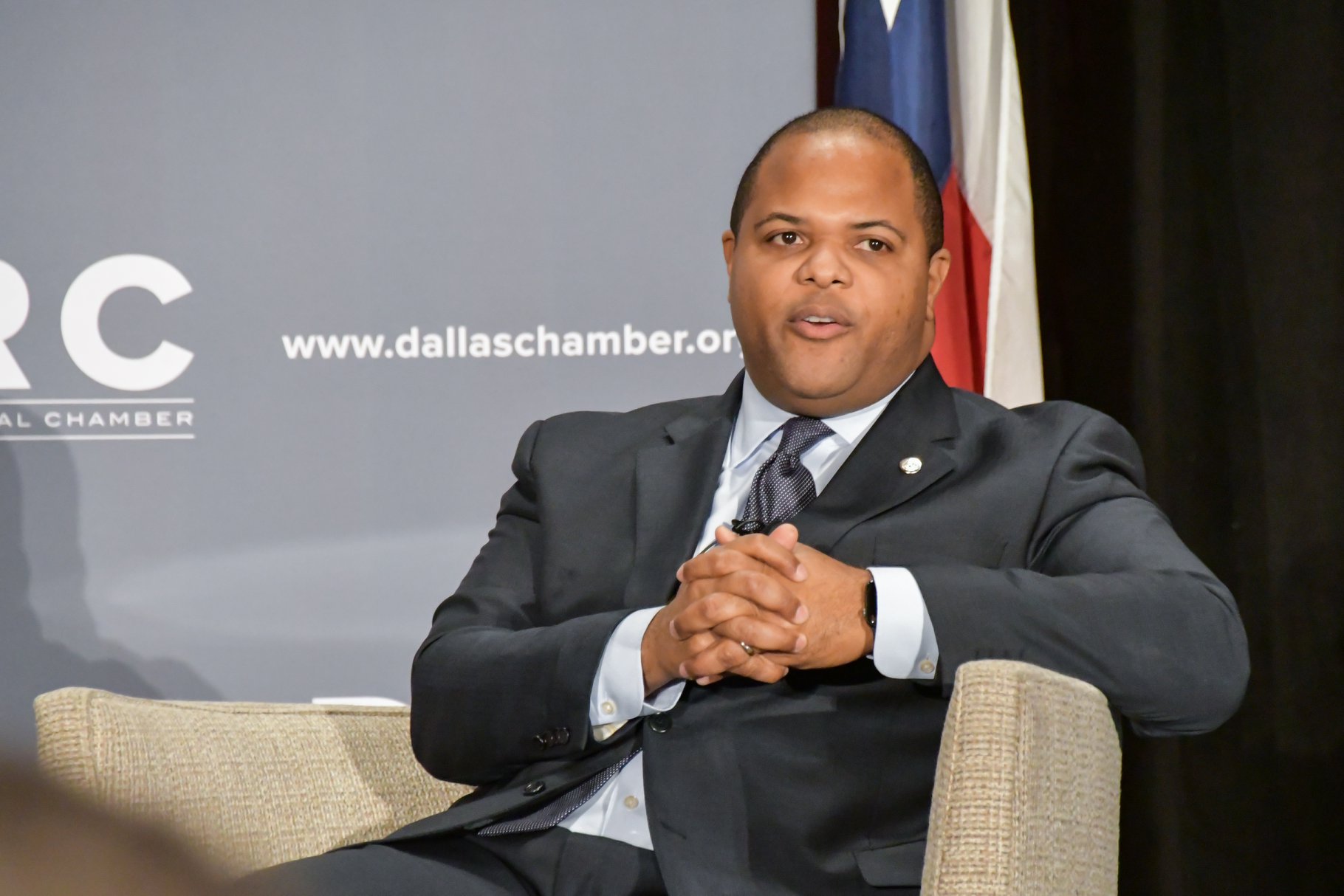Mayor Eric Johnson was embarrassed by his colleagues on the City Council last week. This week, it happened again, and the Council went on the offensive.
Last week, the City Council unanimously voted down the mayor’s amendment to order the city manager to cut staff salaries by $6.5 million, freeing up money for infrastructure improvements, among other things. They instead voted to take $7 million from police overtime. After the defeat, Johnson left at lunch and didn’t return to the meeting, which dragged on late into the night. Then he spent the week telling anyone who would listen that he was up against a City Council seeking to “defund the police” instead of the bureaucracy. Johnson went on a tour of local outlets: the Morning News editorial board, conservative talk radio, television news stations, his 35,200 or so Twitter followers, subscribers to his email newsletter.
But the Council refused to let Johnson control the narrative of this budget cycle, refuting the idea that they were defunding the police department. They also sent a message to activists that the current City Council will not adopt sweeping reforms to police funding in next year’s budget.
What they are willing to do is take $7 million from the line item for police overtime — just under a third of its total budget for overtime — and spend it on more civilian positions in the department, adding lighting in neighborhoods that need it, funding infrastructure improvements, and building more bike lanes. Council and the mayor are aligned on what to fund, but not how to fund it.
Johnson instead wanted to direct City Manager T.C. Broadnax to cut $6 million from the salaries of city staffers, leaving the particulars to Broadnax to figure out. (His second attempt was $500,000 less than his first.) His colleagues on Wednesday refused to do so, voting Johnson’s amendment down 13-2.
“Those are city employees who earn right around $60,000 a year; they’re our most vulnerable city employees,” said Councilman Chad West, who represents North Oak Cliff. “My [Housing and Homelessness Solutions] committee assists families who make $60,000 a year and try to live off that and we try to find them affordable housing. This could put many of our employees into that category.”
It’s worth noting that $7 million is pennies in the context of the entire general fund budget, which totals $1.4 billion. The budget for the police department is $514 million, about 40 percent of all the city’s general fund spending. There remains $17 million left for police overtime spending, even with the cuts. Opponents to the mayor noted that, in 2010, the police department spent $12 million in OT when it had hundreds more police officers on the force. They believed cutting salaries of employees could have a far more significant impact on their households than it would the operations of the police.
Cuts will have to come. This year’s budget is balanced. The city got help through federal coronavirus relief funds and a healthier-than-expected commercial property tax roll. But next year, the city’s chief financial officer says she expects a $62 million hole in the budget, mostly a result of cratered sales tax. So if public salaries get cut now, what will it look like when the wound gets even deeper?
Last week was the first set of straw votes to figure out how the Council wanted to change the city manager’s proposed budget, a final version of which will be voted on September 23.
During that meeting, the Council unanimously shot down the mayor’s budget amendment that would’ve ordered the city manager to cut staff salaries by a total of $6.5 million, a progressive cut for employees who made $60,000 or more. Johnson wanted the city manager to take 25 percent from the city’s highest earners. Those who made less received less of a cut; the mayor’s desire for the lower end of staff salaries was a 1 percent cut. He said his plan would affect just 10 percent of City Hall employees.
This is apparently the hill that Johnson will die on during this budget cycle, arguing it is necessary to send a message to the private sector that public employees are sharing in their economic pain.
Council hasn’t agreed.
Broadnax says Dallas offers salaries competitive with other cities. The concern is that these employees would leave, and City Hall would have to find replacements on a lower pay scale. (Johnson does not believe city employees will be able to find higher paying jobs during the pandemic.)
Johnson’s proposed cuts would apply only to employees who are paid through the general fund, not the separate enterprise fund. Employees who mostly service the city’s utilities in seven departments, like Dallas Water Utilities, Storm Drainage Management, and Aviation, would be excluded. Council didn’t believe that was fair.
Last week, after all his colleagues voted him down the first time, Johnson left the meeting and didn’t return. (His spokesman said it was to address a family issue that the mayor hasn’t elaborated on.) That meeting went on until almost 2 a.m., with Council considering about 80 other amendments. Ironically, the mayor wasn’t present while city staffers whose salaries he wished to cut stayed on the line deep into the night to answer questions.
Johnson then spent last week shouting from rooftops instead of whipping votes.
He told the News he would not be negotiating with his colleagues, choosing instead to pressure them into seeing things his way. He sent an email newsletter to constituents, saying he “voluntarily touched a third rail at Dallas City Hall because it’s the right thing to do in these extraordinary circumstances.” He took softballs from WBAP host Chris Salcedo — who at one point referred to COVID-19 as “a China virus pandemic” in the interview — as the mayor painted the Council’s decision as one that would harm the police department during a rise in violent crime.

Johnson tried to get #DefundTheBureaucracy trending on Twitter. His efforts yielded him just one more Council vote, from Far North Dallas’ Cara Mendelsohn.
Last week, his colleagues mostly remained quiet before they voted down his amendment. This week, they spoke. They took him to task for bailing on last week’s meeting. West noted that “last week’s amendments were the results of the collaboration of 14 City Council members who worked together until 2 a.m.” Council member Carolyn King Arnold, who represents parts of Oak Cliff, took umbrage with Johnson’s emails, which she said is “causing a great deal of confusion and second-guessing us as Council members.”
“I just don’t feel that slashing across the board with a butcher knife is the actual way to go,” said Council member Paula Blackmon, who represents the White Rock Lake area. “I think it’s evaluating programs and eliminating them. I believe it is looking at every slot of employee and [analyzing] their role and what is the ROI?”
Johnson told his colleagues that they were confused. His new amendment would direct the city manager to come up with a plan to save $6 million without cutting any jobs or instituting furloughs. It didn’t dictate which employees took which cuts; that would be Broadnax’s decision. The mayor said he received “500-plus emails” from constituents in support of his amendment. He waved around a stack of papers for effect.
“The people of this city are crying out to us and saying you guys aren’t special over there, you’re not immune from this, you’re taking our tax dollars and you’re spending it in ways they don’t agree with,” Johnson said. “This they agree with.”
During a dinner break in the meeting, six Council members gathered outside Council chambers for a press conference in which they refuted the mayor’s narrative that they were defunding the police department (Paula Blackmon, Adam Medrano, Adam Bazaldua, Omar Narvaez, Chad West, and David Blewett). Four more members weren’t present but conveyed their support for the message (Tennell Atkins, Carolyn King Arnold, Jaime Resendez, and Lee Kleinman).
“I just want to set the record straight going forward,” Bazaldua said. “No one on the Council wanted to defund the police. It’s simply not what we proposed and it’s simply not what we have done.”
It’s an interesting statement, considering the 60 or so speakers that signed up for public comment. Most sounded like they were organized by Our City Our Future, the activist group that has recommended the Council reallocate $200 million from the police department to pay for social services.
The Council’s comments show just how long of a shot that will be this year, at least. Protests in the streets have continued for more than 100 straight days. Each time the Council considers a measure related to policing, the public comment period is filled with speakers demanding change. But the political will to meet activist demands does not exist in Dallas like it does in Austin, which pulled $150 million from its department.
Johnson’s rhetoric is not correct — a actual defunding of police would require structural changes to how the city funds the department. The $7 million is .08 percent of the police department’s budget. Small potatoes indeed.
Broadnax’s budget actually gives the department more money. It also increases the amount of money spent on mental health services, housing, employment training, and infrastructure. It plans to have 110 fewer officers over the next two years. But the department still gets its cash.
Johnson, meanwhile, is screaming on a private island. In his inauguration, he asked that Council members treat one another “with a spirit of grace, a tone of civility, and we need to be coming from a posture of friendship.” He said his election “means a new culture of civility at City Hall.” Fast forward to last week and he’s telling the News that “personality politics” shouldn’t be a part of budget discussions and tweeting that “Defund the Police may have won a battle, but will not win the war.”
The only unity that Johnson appears to have created around the horseshoe is a solid voting bloc against his priorities.





